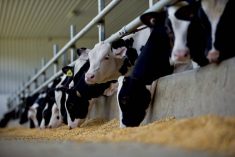The University of Saskatchewan’s Vaccine and Infectious Disease Organization (VIDO) will soon get an extra $1.7 million per year from the provincial government for study of infectious diseases and development of vaccines for animals and people.
The commitment brings the Saskatchewan government’s annual funding for VIDO up to $3.5 million, the province said in a release Thursday.
In the release, Advanced Education Minister Rob Norris described VIDO as “part of a unique life sciences cluster at the U of S that will attract top medical, educational and research professionals to our province.”
Read Also

U.S. livestock: Cattle futures drop on Trump call for lower prices
Cattle futures on the Chicago Mercantile Exchange dropped sharply on Wednesday, reacting to comments from United States President Donald Trump…
The funding increase will be phased in over two years, the province said. In 2008-09, VIDO will get another $1.3 million in operational funding from the province for a total of $3.1 million. The total provincial investment will increase to $3.5 million in 2009-10.
“This investment helps put VIDO on a sustainable path for the future, ensuring that its ground-breaking research significantly enhances Canada’s capacity to fight infectious disease in both animals and humans,” U of S president Peter MacKinnon said in the release.
VIDO, which in recent years has expanded its research into human health applications, is known for development and commercialization of products for the food animal industry. VIDO’s seven livestock vaccines have had a $1.2 billion impact on the western Canadian economy, the province said.
Its humanitarian work with Microsoft founder Bill Gates’ foundation promises to improve vaccines for newborns in the developing world, the province added in its release.











